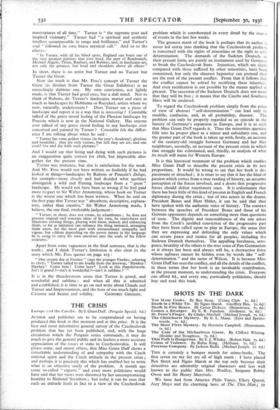THE CRISIS
Europe and the Czechs. By S. Grant Duff. (Penguin Special. 6d.)
AUTHOR and publisher are to be congratulated on having produced this book at this moment and at this price. It is the best and most informative general survey of the Czechoslovak problem that has yet been published, and, with the huge circulation which the Penguin series commands, it may do much to give the general public and its leaders a more accurate appreciation of the issues at stake in Czechoslovakia. It will please some, and annoy others, that Miss Grant Duff shows a remarkable understanding of and sympathy with the Czech national spirit and the Czech attitude in the present crisis ; and perhaps it is precisely this which has enabled her to write what is an objective study of the problem. A month ago some so-called " experts " and even more politicians would have said that her views were distorted by her uncompromising hostility to National Socialism ; but today it can be seen that such an attitude leads in fact to a view of the Czechoslovak
problem which is corroborated in every detail by the cour, of events in the last few weeks.
The greatest merit of the book Is perhaps that its author Is never led astray into thinking that the Czechoslovak problem is concerned with the rights of minorities or the right to self- determination. The demands of the Sudeten Deutsch, in their pre-sent form, are purely an instrument used by Germany to break the Czechoslovak State. Injustices, which are slight compared with those suffered by other minorities, have been committed, but only the sheerest hypocrisy can pretend they are the root of the present conflict. From that it follows that the conflict cannot be solved by rectifying these injustices. And even rectification is not possible by the means applied at present. The secession of the Sudeten Deutsch does not mean that they will be free ; it means that the Czechs and Southern Slays will be enslaved.
To regard the Czechoslovak problem simply from the point of view of abstract " self-determination " can lead only to muddle, confusion, and, in all probability, disaster. The problem can only be properly regarded as an episode in the history of Germany's expansion in Europe, and it is as such that Miss Grant Dull regards it. Thus the minorities question falls into its proper place as a minor and subsidiary one, and the greater part of the book is taken up with, firstly, an account of the century-old struggle between Germany and her Slav neighbours, secondly, an account of the present crisis in which that struggle has culminated, and, thirdly, an analysis of what its result will mean for Western Europe.
It is this historical treatment of the problem which enables Miss Grant Duff to describe the present crisis in its just proportions. It would be wrong to say that her book is dis- passionate or detached ; it is truer to say tliat it has the kind of passion which comes from a true reading of history, an accurate perception of the forces involved, and a desire that progressive forces should defeat reactionary ones. It is unfortunate that there has been little of this kind of passion in English and French diplomacy during the crisis ; but of two actors in the drama, President Benes and Herr Hitler, it can be said that they have spoken with the authentic voice of history. The contrast between the speeches of President Benes and those of his German opponents depends on something more than questions of taste. The dignity and reasonableness of the one arises from the Czech's justified conviction of the progressive part they have been called upon to play in Europe, the sense that they are expressing and defending the only values which can secure peace and justice for all peoples, including the Sudeten Deutsch themselves. The appalling harshness, arro- gance, brutality of the others is the true voice of Pan-Germanism as it always has been and always will be, a destructive force whose ugliness cannot be hidden even by words like " self- determination " and the name of Wilson. It is because Miss Grant Duff has seen the conflict, and all the details of the conflict, in these terms that her book is an invaluable contribution, at the present moment, to understanding the crisis. Everyone can afford 6d., and every one, particularly politicians, should buy and read this book.














































 Previous page
Previous page